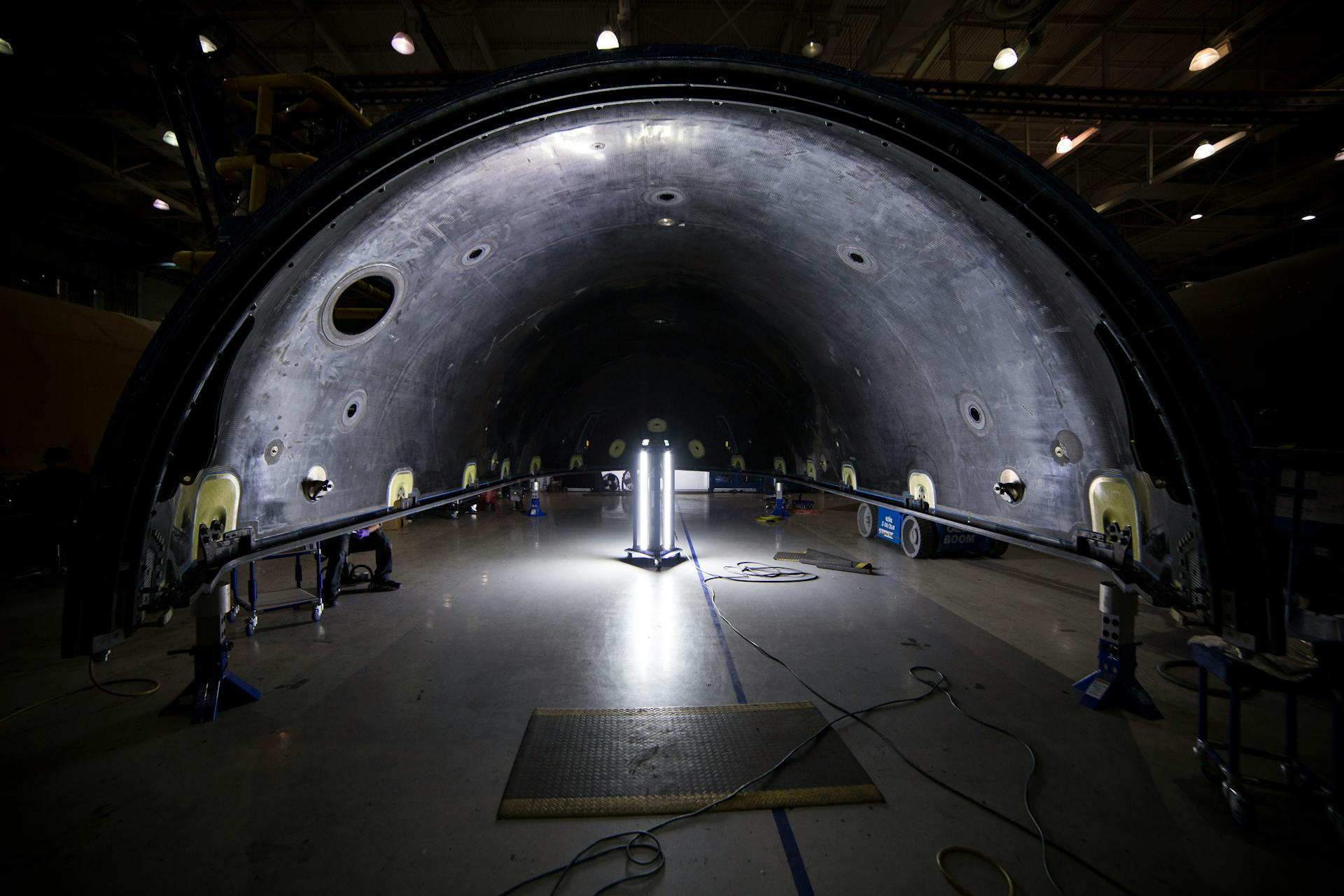
Manufacturing Execution System (MES) is a software solution that helps manufacturers streamline their production process, increase efficiency, and reduce costs. It is an essential tool for monitoring and controlling the entire manufacturing process, from the raw materials stage to the finished product delivery. MES provides real-time data on production operations, allowing plant managers to make informed decisions about how to optimize their processes.
MES provides a centralized system for managing all aspects of production including scheduling, tracking, quality control, and reporting. It helps manufacturers identify bottlenecks and inefficiencies in their processes, enabling them to take corrective measures quickly. MES also integrates with other systems such as Enterprise Resource Planning (ERP), Supply Chain Management (SCM), and Product Lifecycle Management (PLM) to provide a complete end-to-end solution for manufacturing operations.
Discover the MES System: Your Key to Streamlining Production

Manufacturing Execution Systems (MES) are dynamic information systems that control manufacturing operations and improve the flow of information on the shop floor. The manufacturing execution software mes aims to support effective execution of production operations, improve output production, and provide real-time features for shop floor planning.
The MES system helps to manage the entire product life-cycle from order management, raw materials and finished goods inventory, through to manufacturing data analysis and product traceability. By integrating with other systems such as Enterprise Resource Planning (ERP) software, the MES system can provide a comprehensive picture of shop floor operations.
MES also supports services such as quality assurance, maintenance management, and document control. With an MES system in place, manufacturers can streamline their shop floor processes by reducing waste in terms of time, labor, and materials. This results in increased efficiency and productivity for companies looking to improve their bottom line.
How MES Can Improve Your Manufacturing Process

Manufacturing execution systems offer a wide range of long-term benefits when it comes to improving the manufacturing process. With MES, manufacturers can streamline their production operations and track every aspect of the process in real-time. This allows for better decision-making, improved quality control, and overall increased efficiency. MES also helps reduce waste by providing data on material usage and inventory levels. Overall, implementing an MES system can greatly improve your manufacturing process and help your business thrive in today's competitive market.
1. Reduce costs
MES can help businesses reduce manufacturing costs by helping them track costs and identify saving opportunities. MES software collects data from the shop floor, allowing companies to analyze their expenses and make informed decisions about how to increase productivity and reduce waste.
By implementing MES, businesses can streamline their operations and eliminate unnecessary expenses. The software provides real-time data on production processes, enabling managers to make quick decisions that can significantly impact the bottom line. Ultimately, reducing expenses helps businesses remain competitive in the marketplace while increasing profitability.
2. Minimize inventory
Minimizing inventory is a key objective of MES. An MES system makes keeping inventory levels optimal a breeze. The system provides a real-time view of the stock, ensuring that inventory levels remain optimal, which reduces carrying costs easy.
Through the use of automation and data collection tools, an MES system can precisely track raw materials as they move through the production process. This allows manufacturers to keep just enough inventory on hand to meet demand while reducing the risk of overstocking. By optimizing inventory levels, manufacturers can reduce carrying costs and free up capital for other investments.
3. Eliminate paperwork
Eliminating paperwork is a crucial aspect of modern-day industrial operations. This is where manufacturing execution systems (MES) come in handy. In reality, adopting MES eliminates paperwork and improves production efficiency effortlessly.
Gone are the days when manual data-entry processes were the norm in daily operations. MES technology replaces these processes by automating most tasks that required paper-based documentation, such as work orders, maintenance logs, and quality control records. With this automation, there's no longer a need to chase after lost paperwork or decipher illegible handwriting. As a result, production efficiency increases while errors decrease, leading to more profits for the organization.
Revolutionizing Manufacturing: The Exciting Prospects of MES
Manufacturing is undergoing a significant transformation due to technological manufacturing trends such as Industry 4.0, Internet of Things (IoT), and Artificial Intelligence (AI). Manufacturing Execution System (MES) is one of the most promising tools that can enable organizations to achieve their objectives by providing real-time visibility into the entire manufacturing process. MES enables organizations to track raw materials, work in progress, and finished products using smart sensors and predictive analytics. With MES, manufacturers can optimize production minimize downtime, improve quality control, and respond quickly to changing market demands.
Additionally, MES offers an enterprise system that provides a comprehensive view of manufacturing operations from the shop floor to the supply chain. As demand for highly flexible manufacturing increases, MES plays a critical role in enabling manufacturers to adapt quickly to changing customer demands while maintaining high levels of quality and efficiency. By integrating with other enterprise systems such as Enterprise Resource Planning (ERP), Customer Relationship Management (CRM), and Supply Chain Management (SCM), MES streamlines data flows across various departments.
In conclusion, MES is revolutionizing manufacturing by providing real-time visibility into the entire manufacturing process while optimizing production processes and minimizing downtime. It also improves quality control and provides much-needed flexibility for organizations operating in dynamic markets. In this era of technological advancements, adopting an MES strategy has become essential for companies that want to compete effectively in today's global marketplace.
Revamp Your Business with a Transformational Starting Point
MES, or Manufacturing Execution System, is an essential tool for businesses looking to streamline their operations and overcome industry challenges. A specialized MES solution provides real-time visibility into production processes, enabling businesses to optimize workflows and improve efficiency. With the right MES system in place, businesses can achieve greater productivity, reduce waste and downtime, and increase profitability. If you're looking to revamp your business and transform your operations, implementing a specialized MES solution is the perfect starting point.
Benefits of a Manufacturing Execution System

A MES automation system can deliver significant improvements to a company's bottom line profitability. The system streamlines the planning process, reducing manufacturing cycle time and eliminates data entry time. By reducing work-in-process and eliminating paperwork, the MES reduces lead times and improves product quality.
Another key benefit of implementing a MES includes empowering plant operations people with real-time data. This enables them to make better decisions on the shop floor, improving customer service by ensuring on-time delivery of quality products. Additionally, the system reduces setup costs and wait times with precise sequence planning.
In sum, investing in a Manufacturing Execution System has numerous advantages for any manufacturing operation. It not only eliminates lost paperwork but also improves product quality and reduces setup costs wait times. By providing real-time data to plant operators, it empowers them to make informed decisions that help improve customer service and ultimately leads to greater bottom-line profitability for the company.
Making Sense of How MES Systems Connect with Other Systems

MES, or Manufacturing Execution System, helps the product developer manage every aspect of the actual manufacturing process. MES systems collect, store and make production data available for analysis. This allows managers to make informed decisions about how to improve the entire manufacturing process, resulting in maximum efficiency and productivity smart manufacturing.
It's important to note that MES doesn't exist in isolation. It is part of a complex system that includes other control systems based on the Purdue Reference Model or CIM hierarchical form. At Level 3, we have Manufacturing Execution System (MES), while Manufacturing Operations Management System (MOMS) resides at Level 4. ERP software is responsible for manufacturing planning, logistics level 1 and 2 systems control production processes including continuous, discrete control and batch automation systems.
Finally, Level 0 refers to physical manufacturing production at the shop floor level with all these systems communicating via Level 1-4 systems. In conclusion, MES plays a crucial role in developing automation for smarter and more efficient manufacturing processes that integrate into an international standard for productivity and communication between different levels of manufacturing operations management system mothership.
Frequently Asked Questions
What is a manufacturing operations center (Mes)?
A manufacturing operations center (MES) is a system that manages, monitors and optimizes production processes in real-time. It provides visibility into every aspect of the manufacturing process, from raw materials to finished products, allowing manufacturers to improve efficiency and reduce costs.
What is Material Requirements Planning (MES)?
Material Requirements Planning (MRP) is a system that helps manufacturers ensure they have the right materials at the right time to produce goods. It uses data such as sales forecasts, inventory levels, and lead times to create a plan for purchasing and production.
What is Manufacturing Management System (MES)?
Manufacturing Management System (MES) is software that helps manufacturers manage and optimize their production processes by providing real-time data, analytics, and insights. It streamlines operations, increases efficiency, reduces downtime, and improves overall productivity.
What is MES and how does it work?
MES (Manufacturing Execution System) is a software that monitors and manages the production process on the factory floor, providing real-time data and insights to optimize manufacturing operations. It works by collecting data from various sources, analyzing it, and providing actionable information to improve efficiency, quality, and productivity in manufacturing.
What is a Manufacturing Execution System?
A Manufacturing Execution System (MES) is a software system that helps manufacturing companies manage and monitor their production processes. It provides real-time visibility into shop floor activities, tracks production progress, and optimizes production schedules to improve efficiency and reduce costs.
Featured Images: pexels.com


